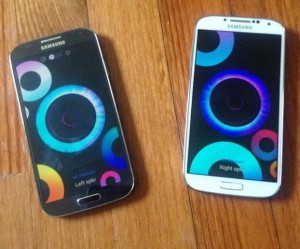Group-Playback Apps Let You Choose Your Own Copyright Adventure
 The play button is getting yet another upgrade from the Internet: the ability to function in sync across multiple devices. Instead of only being able to listen to a song on your own computers, a few apps can cue up that tune on other gadgets–in effect, turning them into Internet-connected speakers.
The play button is getting yet another upgrade from the Internet: the ability to function in sync across multiple devices. Instead of only being able to listen to a song on your own computers, a few apps can cue up that tune on other gadgets–in effect, turning them into Internet-connected speakers.
Is that legal? You’ve heard this before in copyright debates: It depends!
The best-known implementation of the concept is Samsung’s free Group Play app, which comes preinstalled on its Galaxy S 4 but also works on other recent Samsung phones and tablets.
It’s pretty straightforward to set up: Open the app and tap “Create group” on your device, choose a song and then a second phone within WiFi range can have the same tune streaming in sync–with its left and right channels sent separately to each device for a proper stereo effect.
The default setting requires you to set a numeric passcode for the group, with up to nine other devices allowed, but you can assign a single-digit passcode or make the group open. You can also share pictures and documents or play games this way.
Last weekend, I saw a similar concept at the Day of Fosterly startup conference: a Web app called Speaker Blast, which lets you upload a song to a server and then have it play through multiple Web browsers at a preset time.
Two tests of this app (still in private beta) did not work quite as smoothly. The desktop, laptop and iPad evidently did not have the exact same time, resulting in playback a tic out of phase–as if I were hearing “Radio Free Europe” played not by R.E.M., but by a cover band needing more rehearsal.
A third app, Seedio, offers similar group-playback features on iOS, but I haven’t tried that yet.
All of these products intersect with a core concept of copyright law: the restriction on the “public performance” of a copyrighted work without a proper license.
Cranking up a song becomes a public performance if the audience consists of “a substantial number of persons outside of a normal circle of a family and its social acquaintances”–whether or not they “receive it in the same place or in separate places and at the same time or at different times.”
The Group Play app’s disclaimer doesn’t quite make the same point: “You must use the Group Play only for personal and non-profit purposes and if it is used for commercial use, it violates the copyright law.”
Speaker Blast’s site, meanwhile, suggests a variety of uses that wouldn’t all pass the public-performance test: “your next flash mob, impromptu dance party, beach gathering, aerobics class, protest, promotional event or a use we haven’t thought of.”
Founder Ryan Spahn, a Web developer in Baltimore, emphasized that last point in an interview Thursday: “It could be a speech… it could be a choir director uploading a hymn. It’s up to the user.”
Three copyright lawyers I talked to said the legality of these services is also largely up to the user: If you’re only playing songs through your friends’ phones, you’re fine. But even if you bring strangers into the musical loop, the developer shouldn’t be at fault.
But if a developer markets the app for infringing purposes, there’s a risk of liability for inducing copyright infringement, courtesy of the line the Supreme Court drew in its 2005 ruling against the Grokster music-sharing service.
Jim Burger, a lawyer with Thompson Coburn, said the answer might also depend on which federal circuit court takes a case, citing the diverging rulings on the technologically similar Aereo and Aereokiller services from the Second and Ninth Circuits.
None of these app developers seem to have gotten in hot water with copyright holders yet–the Recording Industry Association of America passed on commenting–but I would be surprised if that lasted. If it’s a problem for Aereo to charge for using the Internet as a very long stretch of coax cable between an antenna and a screen, wouldn’t it also be troublesome to ship a tool that turns the Web into speaker wire?
As Burger put it: “I think the content industry has to say this is a problem.”








